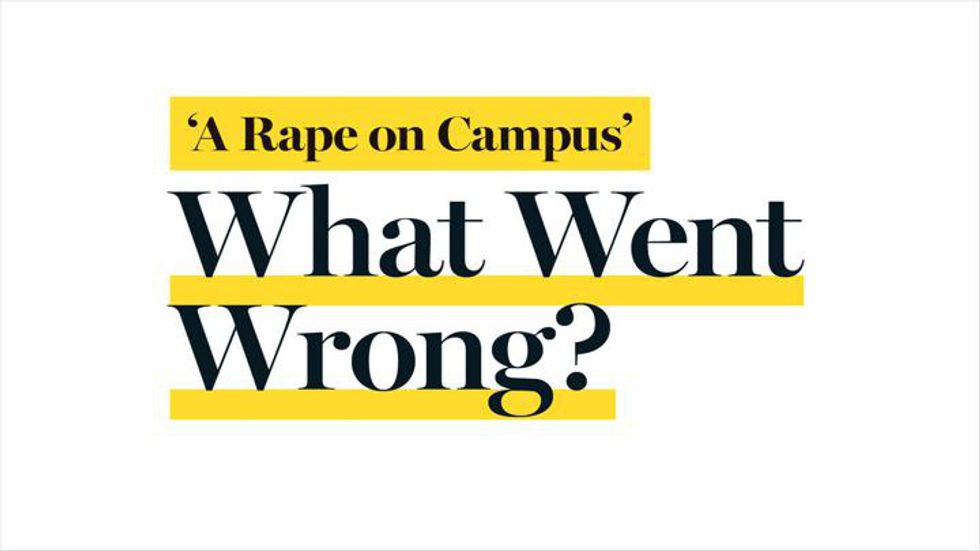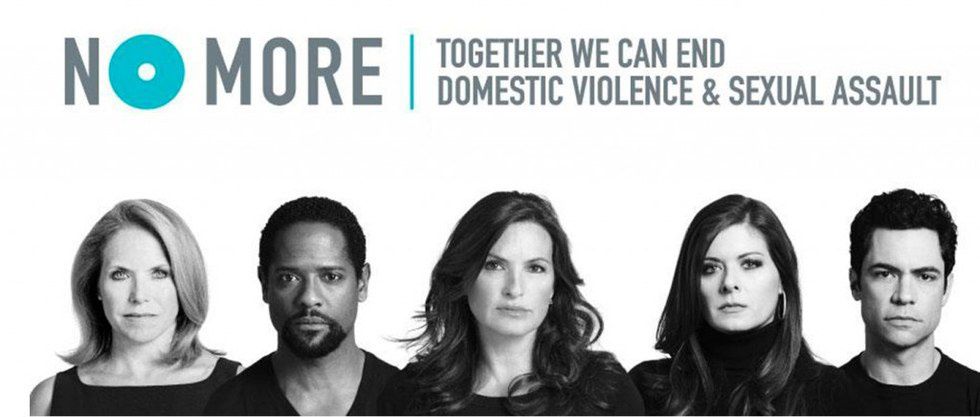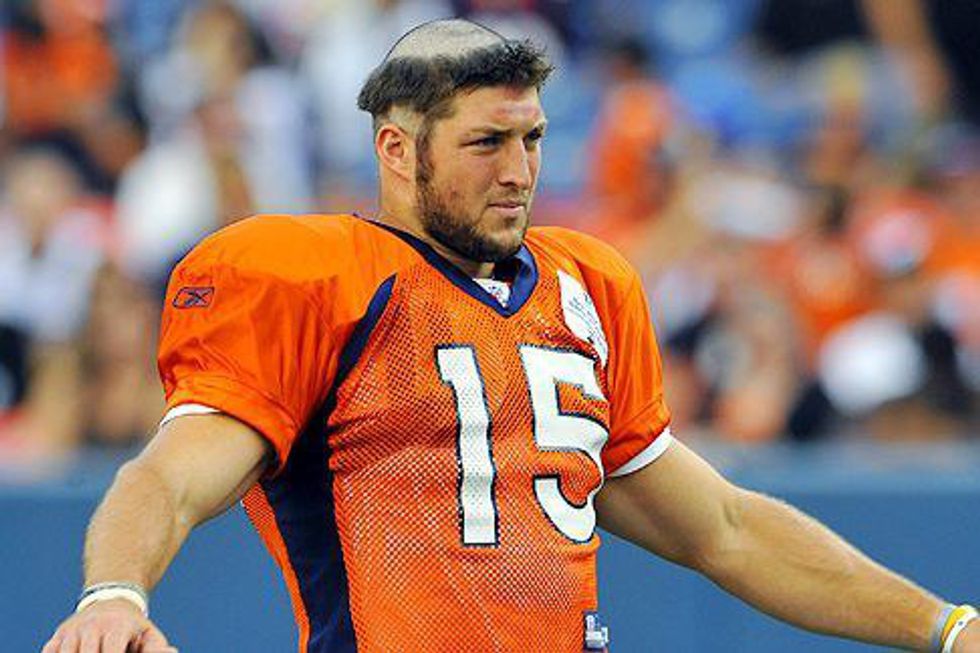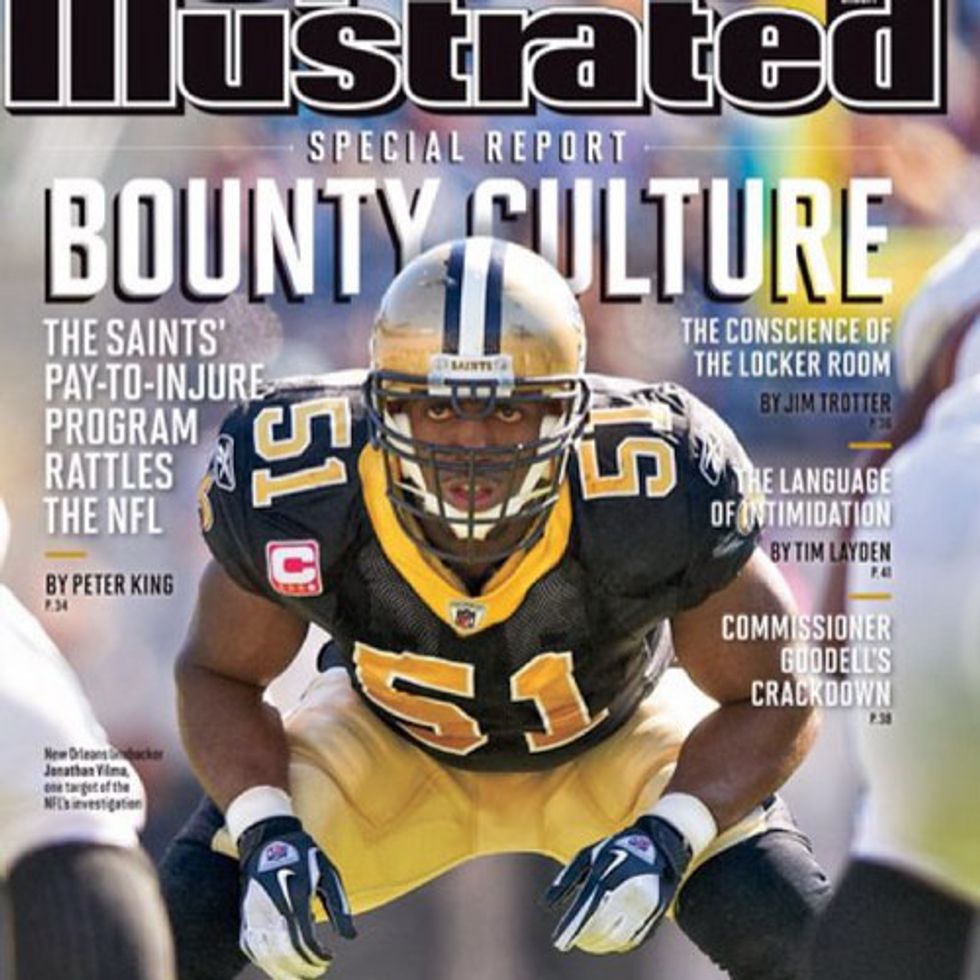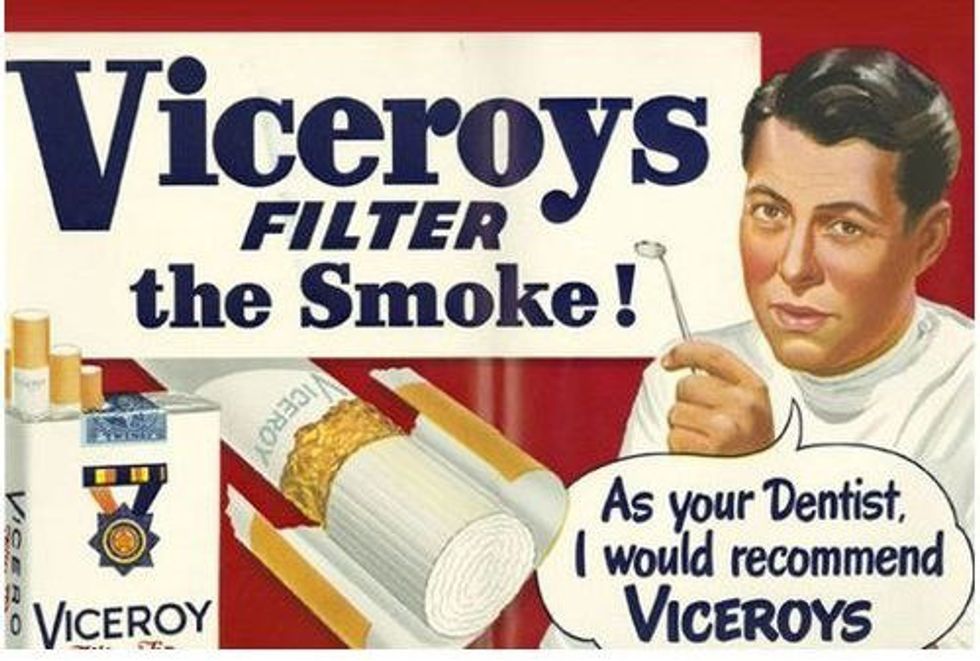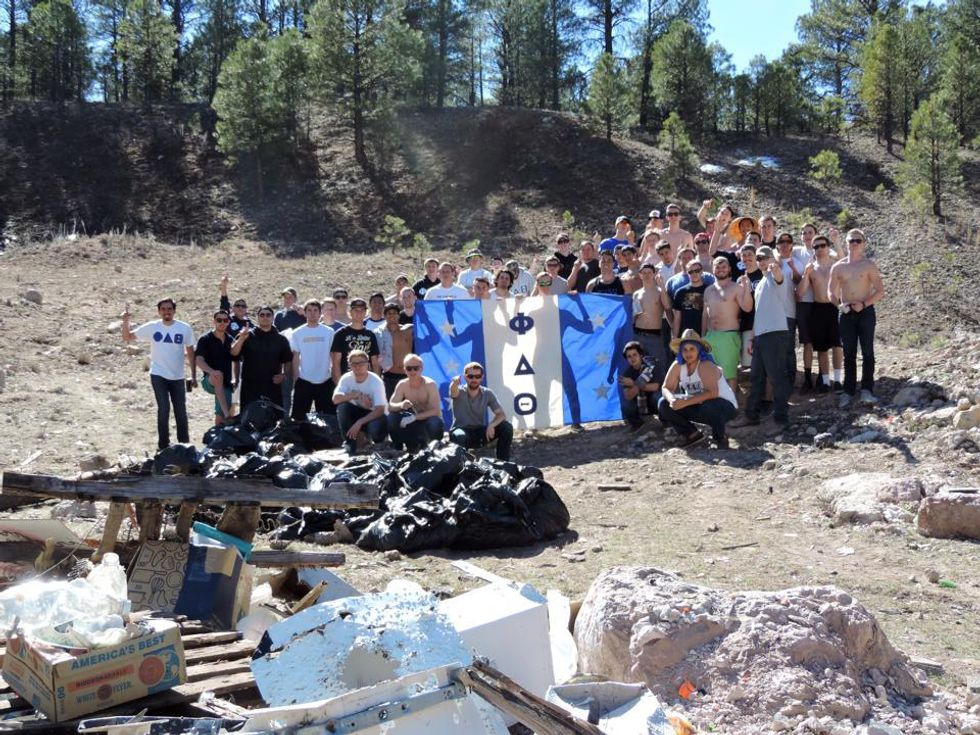Another video leaked online. It showed a very large man carrying a new member on his shoulder. He took him to a big tub filled with ice water and threw him in. You could hear other men swearing at him the entire time, and at the end, one man yelled, "You stand up for yourself!"
The new member was New York Giants rookie corner-back Prince Amukamara, and the large man throwing him in was veteran defensive-end Jason Pierre-Paul. This incident was posted online by the team's punter, and it barely made any news, but more on that later.
Let's be real. We all know fraternities have a huge public image issue. Physical abusers like Penn State's Kappa Delta Rho and racist fraternities like Oklahoma's SAE make all fraternities look bad. Issues like these are easy to solve, and here's how:
- If an individual or group of individuals are racist or break the law, punish them accordingly. If an individual or group of individuals are convicted of rape, kick them out of the fraternity and school immediately. End of story.
- If a fraternity as a whole does something illegal or racist, don't let their actions go unpunished. If they're proven to have excessive hazing practices, kick them off campus for good.
If schools and fraternity headquarters are tough on crime, only the good and law-abiding fraternities will survive. America's fraternity system is like a rose bush. It can be a big, beautiful, and wonderful thing. When a rose gets ugly and dies, you have to cut that stem way back. Eventually, more roses will grow in its place, bigger and better ones. If you never trim a rose bush, the whole thing will get ugly and full of dead roses.
So that's that. But guess what the biggest problem is facing fraternities today? It is not drinking, hazing, or even racism. It is the media.
We live in a society where the media would rather talk about Kim Kardashian's second child instead of Akon's Lighting Africa campaign, or the changes to the Patriot Act. Today's media rarely reports about actual news, and when they try to, they often jump to conclusions and talk about the same story for weeks, even after the public gets tired of the story.
Take the recent Rolling Stone fiasco as an example. Writer Sabrina Rubin Erdely released an article called "A Rape on Campus," in which she claimed a woman, only identified as "Jackie," was viciously raped in the University of Virginia Phi Kappa Psi fraternity house. She also claimed that the Dean of the school knew about the incident and did nothing about it. All Greek life was suspended at the school while the investigation continued. Meanwhile, this "incident" was seen all over the news and social media. Petitions and protests arose calling for all Greek life in America to be abolished. People wanted to punish all fraternities for the disgusting actions of one chapter.
Then the investigation reached a road block. No one could find any factual evidence confirming the situation. Rolling Stone had Steve Coll, Dean of the Columbia School of Journalism and a Pulitzer Prize-winning reporter, investigate all aspects of their reporting on the article. The results were shocking. The police reports found no factual evidence backing up the story. Even "Jackie's" friends doubted her story and confirmed that most, if not all of her story, was not true. Rolling Stone even admitted that Erdely lied about talking to the fraternity chapter's president and some of "Jackie's" friends. Rolling Stone, in their retraction letter, quoted Coll in saying that "A Rape on Campus" was a "failure of journalism." In fact, the Columbia Journalism Review included it in its list of "The Worst Journalism of 2014."
So what went wrong? Aside from Rolling Stone having no respect for journalistic integrity, they jumped to an erroneous conclusion based off a rape statistic. Statistics say that fraternity men are three times as likely as non-affiliated members to commit rape. Some would argue that the statistics are skewed by the fact that fraternity houses are the most popular places on campuses for Greek and unaffiliated men and women to party. Unaffiliated men can be allowed in or sneak in to fraternity parties all the time and will make the fraternities liable if they do anything illegal. Some also would attribute it to the fact that over 70 percent of rapes go unreported. That leaves 70 percent left in ambiguity and we are left wondering whether it could lower or raise the "three times as likely" statistic. However, since I have journalistic integrity, I will admit that those are just theories.
All statistics and theories aside, fraternity men are the most able to stop rape on college campuses. Think about it - at a party, they are surrounded by dozens of their closest friends who would have their back no matter what. All it takes is for one fraternity member to tell his brother to stop. All it takes is for one fraternity member to tell his brother, "She's too drunk." All it takes is for one fraternity member to stand up and say, "No more." If that one member cannot get his brother to stop, then he needs to grab the help of his nearest brothers. Fraternity men always champion their fraternity's "brotherhood." It looks like it's time to put our "brotherhood" to the test.

The most common allegation brought against a fraternity is about hazing. And the media loves reporting about these situations. But in reality, the amounts of fraternities who have been proven to haze is so small, that it is almost a joke. Bloomberg Business has a page called, "Every time a fraternity or sorority got in trouble this year." In it, they list every allegation brought against a fraternity or sorority so far in 2015. Keep in mind, that the list includes allegations that were proven false and it combines fraternities and sororities into one.
Only 0.26 percent of social Greek organizations in America were accused of hazing this year.
The page lists 29 hazing allegations this year. There are roughly 11,000 social fraternities and sororities in America. That means that only 0.26 percent of social Greek organizations in America were accused of hazing this year. Compare that to the fact that there were 51 arrests in the NFL in 2014, which counts for 1.77 percent of the league. I understand some players were arrested more than once, but remember that some fraternities and schools received multiple violations as well.
An Alfred University study found that hazing in NCAA college sports teams was the same, if not more than hazing in Greek organizations. The study found that 80 percent of college athletes were victims of hazing, which was as common as in Greek organizations. In fact, a University of Maine study found that 74 percent and 73 percent of students were victims of hazing in a Varsity Athletic Team and Greek organizations, respectively. Studies also show that 10 percent of NCAA female athletes were physically hazed, and 6-9 percent were sexually hazed. We glorify an organization where hazing is arguably worse than Greek life.
How many of you laughed at this picture? I know I did. So did the thousands of people who saw this picture in the Bleacher Report Article, "Tim Tebow and the NFL's 12 Most Hilarious Training Camp Hazing Moments." That's the NFL journeyman Tim Tebow who, along with all other Denver Bronco rookies, had to get an embarrassing haircut. Bleacher Report called it "hilarious," and many of us laughed at it, but it is still hazing. When a fraternity does something like this, they get in huge trouble and most likely would get suspended. But why? There really isn't a difference. I bet there were plenty of Broncos, including Tebow, who really didn't want to be humiliated with bad haircuts. Some states would even legally consider that hazing but nothing will happen about it because we think it's funny, and the NFL makes the media billions.
Consider that in 2012, the New Orleans Saints were found to have a program where the coaches would pay their players bonuses, in thousands of dollars out of their own pocket, if they physically harmed specific players on teams they were playing. In the 2010 NFC championship game, the Saints played the Brett Favre-led Minnesota Vikings in a 31-28 victory. Brett Favre was briefly knocked out of the game after what was later deemed an illegal hit. The Vikings' coach pointed out 13 dirty hits throughout the game. The Saints were found to have specific targets during the entire scandal against Brett Favre, Kurt Warner, Cam Newton, Aaron Rodgers, and Frank Gore--some of the best players in the NFL. The people involved were all suspended, but all returned only a year later. No one was kicked out for good, and the vast majority of the people involved still have jobs in the NFL today. Saints players were paid to physically harm other players; to physically haze other players, and they are still in the NFL. We wouldn't want the NFL and the media to lose money by enforcing harsher punishments, right?
The NFL, NCAA sports teams, and fraternities haze their members in silly and violent ways. The NCAA and NFL have suspected and convicted perpetrators of rape, spousal and child abuse, animal abuse, drug abuse, and even murder: Jameis Winston, Randy Gregory, Ben Roethlisberger, Ray Rice, Ray Lewis, Josh Gordon, Michael Vick, Joseph Randle, Ray McDonald, Adrian Peterson--the list could go on for pages. The NFL punishes those individuals, and that's it. No one calls for getting rid of the entire NFL. So only fraternities get brought up in the media in discussion of abolishing them? Why? It's not only because professional sports make the media billions, but it is also because the American people see fraternities as organizations full of self-entitled, drunk, physical and sexual abusers.
How to Fix the Problem
That's how America sees fraternity men. They don't see them like the gentleman in this video below. If you don't have time to watch it, save it for another time, and I'll tell you the basics.
A brother in the Phi Alpha Tau fraternity at Emerson College needed help. He was born a female and was doing everything possible to transition to a male. He couldn't go all the way because he couldn't afford gender-reassignment surgery. That's where his brothers came in. They set a goal for raising $2,000. When they found out they would need $8,125 total, they blew past it and raised $21,308. They donated the leftover funds to charity.
But this barely made any news. Finally, a feel good story about someone becoming who they truly are, and a story showing how some fraternities can do great things, and it got no where. Caitlyn Jenner made the news though. By all means, I respect what she did and 100 percent support her, but really? We live in a society that loves the Jenners and Kardashians more than feel good stories like this one.
If the media threw out the stories about Kim's new hairstyle, Kanye still being too cool to smile on camera, or Johnny Manziel leaving rehab, and replaced them with stories like Phi Alpha Tau's story, our perception of fraternities would change because fraternities would change as well.
If the media reported about even the simplest fraternity success stories, America would see fraternities differently. Instead of hearing about the same hazing story every day, we could hear about something simple, like my fraternity in this picture when we had an extraordinary successful day cleaning up the incredibly trashy Flagstaff quarry. The place was turning into an unofficial city dump. Instead of letting the problem continue, we rushed to the scene and helped out both the city of Flagstaff and the environment. If people saw fraternities for what they really are, successful organizations that champion brotherhood, that truly want to make a difference in their community and that would even go so far as to raise money for a brother's gender reassignment surgery, then maybe we'd have those kinds of men rush, instead of the racists and abusers we see in the media. If we advertise fraternities as healthy organizations, like a beautiful and bountiful rose bush, then fraternities will truly become that way. If we highlight the success of the thousands of successful organizations instead of the flaws of the few, America will see Greek life for what it truly is.Some people rush fraternities simply because they want to party, because they know fraternities do (every depiction of every fraternity ever depicted in a movie shows they do). Fraternities are advertised that way. If we advertise fraternities as community service and philanthropic powerhouses, which is what they actually are, then you would get the men to rush simply for that reason.
Aside from Anna Kendrick, nothing is perfect. Fraternities and sororities will have flaws, but if America works together by saying "no more" to any wrong that may occur and by focusing on real news stories, then we can all help make Greek life become the true bastion of success, compassion, and leadership that it truly is.






